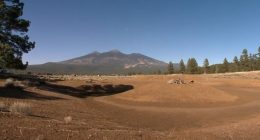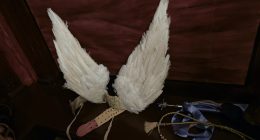
Christian has been named as one of the few of the European Space Agency’s (ESA) official reserves.
And while her mission has not been decided on, she will be the first Australian woman in space.
The 34-year-old from Wollongong went through a rigorous application process that winnowed the field of potential astronauts from more than 20,000 to 11.

“So maths, physics, logic, memory, spatial awareness, that kind of thing.
“And then from there, if you were successful in that round, they brought it down to 400 people to do psychological testing.
“After that, there was medical testing.”
From now until a potential launch date, Christian will go through the various stages of astronaut training, all while maintaining her day job at the National Research Council in Italy.
All the while, she will be preparing for whatever mission the European Space Agency decides to send her on.

That could be a 10-day mission to the International Space Station, or a longer-term mission on the yet-to-be launched Lunar Gateway orbiting the Moon.
If the ESA decides to launch a mission to the moon itself, it is possible Christian will be among the astronauts chosen.
“The basic training is all about getting everybody up to speed up to the same level because they take people from really diverse backgrounds,” she said.
Read Related Also: Ukrainian President Zelensky says Putin should stand trial for war crimes before going ‘to hell’
“I mean, you have medical doctors, you have fighter pilots, you have scientists.

“So basically they want to give everybody a base level of understanding across all those topics.”
Christian has a PhD in materials science, but her role in space will be broader.
The tasks assigned to her will likely consist of scientific experiments in many different disciplines – the sort of tests that can’t be conducted on Earth.

“You can only have a small number of people up there so they really need to know how to do everything,” she said.
“And that’s where my experience in Antarctica comes in, because I spent a winter over in Antarctica looking after the permanent observatories for atmospherics and meteorology that are there.
“It was when I was in Antarctica that it really crystallised that I wanted to become an astronaut.”
“It’s the best analogue we have on Earth for a potential Mars mission sometime in the future, in part because of the isolation, in part because of extreme conditions,” she said.
“And of course, also the factor of just being with a small group of people and having to get along.”
While Christian grew up in Australia, including her undergraduate and PhD degrees at the University of NSW, her UK and Italian passports allow her to be a part of the ESA.









